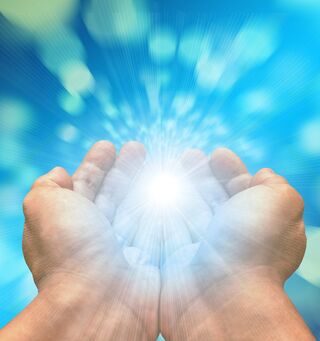Gratitude
The Right Way to Express Gratitude in Relationships
Highlighting responsiveness in expressing gratitude strengthens relationships.
Posted November 18, 2020 Reviewed by Gary Drevitch

What is the best way to thank your romantic partner in a way that strengthens your relationship and makes him or her feel valued? Is it by highlighting the costs your romantic partner has incurred in helping you or by highlighting your partner’s responsiveness to your needs?
For instance, if your spouse helped you prepare for a job interview, should you highlight the costs (“Thank you for helping me despite your bad headache”) or responsiveness (“I was anxious and really needed your support, so thank you for helping me”)?
For an answer to this question, we will turn to an article by Park and colleagues, in press in the Journal of Social and Personal Relationships. But first, a quick introduction to barriers to and benefits of gratitude.
Expressing gratitude in relationships
Gratitude is a moral and social emotion. People experience gratitude (and show gratitude) in response to someone doing a good deed to benefit them (e.g., complimenting them, providing them with assistance).
However, not everyone has the same attitude toward showing gratitude. Some feel showing appreciation is sentimental, or an empty or unnecessary gesture.
Some who have a more positive view of gratitude are still reluctant to express their appreciation to others. Why? Because they assume their gratitude is already known, undervalue the positive effects of gratitude expression on recipients, or worry how awkward the recipient of gratitude might feel.
So, is it worth the effort to overcome such barriers to gratitude? Often, yes. Research supports the benefits of gratitude—both relationship-related benefits (e.g., improved relationships) and health benefits (e.g., better sleep, reduced depression, healthy eating).
Nevertheless, even if we agree that expressing gratitude in relationships is important, we may not agree on the best way to show appreciation and gratitude. This brings us to the investigation, reviewed below, which examined the benefits of two common ways of expressing gratitude—highlighting a benefactor’s responsiveness vs. the costs the benefactor incurred.
Sample and methods
Characteristics of the sample: 111 Canadian couples; average age of 27 years; together for an average of four-and-a-half years; 97% heterosexuals; 66% not married; 30% White.
The investigation included a video-recorded lab experiment and a 14-day daily diary study. During the lab experiment, each couple discussed a kind deed one member (the benefactor) had done that made the other (the beneficiary) feel grateful.
Subsequently, each benefactor completed a questionnaire concerning his or her response to the expression of gratitude by the beneficiary—whether it made the benefactor feel good (“gratitude-specific positivity”) or bad (“gratitude-specific negativity”).
Other items on the questionnaire concerned “positive relationship quality” (feelings of satisfaction with the relationship and closeness during the conversation) and “negative relationship quality” (experiencing tension or conflict during the conversation).
Participants also took part in a diary study, during which they answered questions regarding how they responded to daily conflicts: Through self-sacrifice, partner sacrifice, compromise, or no sacrifice (whether intentionally or because of a lack of opportunities).
Findings: Expressing gratitude and relationship benefits
Benefactors had a more positive view of the gratitude expression and their romantic relationship when the expression of gratitude highlighted their responsiveness to their partners’ needs rather than the costs they had incurred.
In short, highlighting responsiveness was more beneficial than highlighting costs. Statistical analyses showed these effects could not be explained by other factors (e.g., display of affection, mood).
So, why does highlighting the benefactor's responsiveness have these positive effects? Perhaps because feeling valued by one’s romantic partner is central to the communal nature of romantic relationships. Relationships are about needing one’s partner but also about being needed. Indeed, to have fulfilling romantic relationships, people not only need to view their romantic partners as instrumental to their personal goals, but they need to feel instrumental to their romantic partners’ goals as well.
When gratitude expressions repeatedly highlight a romantic partner’s responsiveness and helpfulness, the partner is more likely to feel capable of providing valued help. And these relationship-related feelings of competence can strengthen a romantic relationship.

Takeaway
The importance of gratitude in relationships cannot be overstated. There are many ways to show appreciation, but as the present research shows, highlighting your partner’s responsiveness to your needs might be more beneficial than highlighting the costs he or she has incurred.
For instance, to show appreciation for your partner giving you a massage, the expression of gratitude in Statement B might be more beneficial than the one in Statement A:
A. “Thank you for the back massage. I know you were tired from work, but I really appreciate you giving me a massage.”
B. “My back was so tight, and I was in agony. That massage was exactly what I needed. I really appreciate it.”
Of course, if, for whatever reason (e.g., being highly self-reliant, uncomfortable with intimacy), you do not want to talk about your partner satisfying your needs, then focusing on the costs is fine. In the study, highlighting the costs of a kind deed was associated with some positive outcomes too (just less than highlighting need responsiveness).
Indeed, regardless of the way you choose to do it, it is a good idea to regularly express gratitude and show appreciation to your romantic partner.
Facebook image: fizkes/Shutterstock




